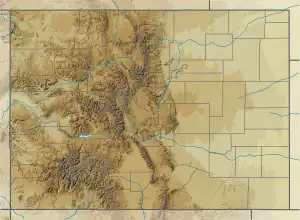Mount Chapin
Mount Chapin is a 12,454-foot-elevation (3,796-meter) mountain summit located in Rocky Mountain National Park, in Larimer County, of Colorado, United States.[3] It is situated 11 miles west-northwest of the community of Estes Park, one mile east of Chapin Pass, and six miles east of the Continental Divide. Mount Chapin is part of the Mummy Range which is a subset of the Rocky Mountains. Topographic relief is significant as the south aspect rises 2,700 feet (820 meters) above Fall River in less than one mile. Neighbors include Mount Chiquita and Ypsilon Mountain to the immediate northeast, and the park's Alpine Visitor Center is three miles to the west.
| Mount Chapin | |
|---|---|
 Southeast aspect, from Trail Ridge Road | |
| Highest point | |
| Elevation | 12,454 ft (3,796 m)[1] |
| Prominence | 414 ft (126 m)[1] |
| Parent peak | Ypsilon Mountain (13,514 ft)[2] |
| Isolation | 1.81 mi (2.91 km)[2] |
| Coordinates | 40°26′01″N 105°42′07″W[3] |
| Naming | |
| Etymology | Frederick H. Chapin |
| Geography | |
 Mount Chapin Location in Colorado  Mount Chapin Mount Chapin (the United States) | |
| Location | Rocky Mountain National Park Larimer County, Colorado, US |
| Parent range | Rocky Mountains Mummy Range |
| Topo map | USGS Trail Ridge |
| Climbing | |
| Easiest route | class 1 hiking[2] |
Etymology
The mountain's name was officially adopted by the United States Board on Geographic Names in 1932.[3] The name commemorates Frederick H. Chapin (1852–1900), a mountaineer, photographer, amateur archaeologist, and author who wrote the 1889 book, "Mountaineering in Colorado: The Peaks about Estes Park."[4] He is best known for his exploration of mesas and ancient Pueblo ruins found in the Mesa Verde area of southwest Colorado. He is also the namesake of Chapin Mesa which shelters the most famous cliff dwellings within Mesa Verde National Park.[5]
Climate
According to the Köppen climate classification system, Mount Chapin is located in an alpine subarctic climate zone with cold, snowy winters, and cool to warm summers.[6] Due to its altitude, it receives precipitation all year, as snow in winter, and as thunderstorms in summer, with a dry period in late spring. Precipitation runoff from the mountain drains north into the Cache la Poudre River via Chapin Creek, and south into the Fall River.
Gallery
See also
- List of peaks in Rocky Mountain National Park
- Mountains of Larimer County, Colorado
References
- "Mount Chapin, Colorado". Peakbagger.com.
- "Chapin, Mount - 12,454' CO". listsofjohn.com. Retrieved 2021-07-21.
- "Mount Chapin". Geographic Names Information System. United States Geological Survey, United States Department of the Interior. Retrieved 2021-07-21.
- Perry, Phyllis J. (2008). Rocky Mountain National Park. Arcadia Publishing. p. 66. ISBN 978-0-7385-5627-7.
- "Chapin Mesa". Geographic Names Information System. United States Geological Survey, United States Department of the Interior. Retrieved 2021-07-21.
- Peel, M. C.; Finlayson, B. L.; McMahon, T. A. (2007). "Updated world map of the Köppen−Geiger climate classification". Hydrol. Earth Syst. Sci. 11. ISSN 1027-5606.
External links
- Weather forecast: Mount Chapin


